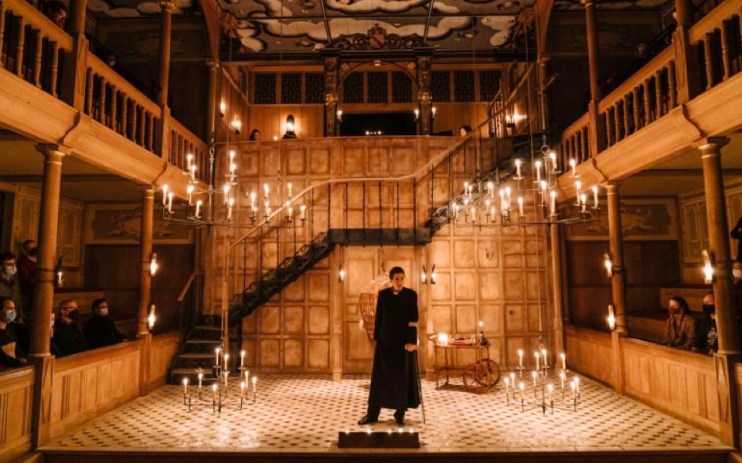Measure For Measure at Sam Wanamaker Playhouse review

Government sleaze is on display again, but at least in the Sam Wanamaker Playhouse’s latest Shakespeare production, it’s entertaining.
In Measure for Measure, the Duke of Vienna delegates power to an outwardly righteous advisor, with the hope he will restore moral order in an increasingly licentious society, but remains in the city in the guise of a priest to observe how events unfold. The advisor, Angelo, has the unfortunate Claudio arrested and sentenced to death for fornication. But when Claudio’s sister Isabella, a novice nun, comes to plead for her brother’s life, a smitten Angelo offers to free the man, if Isabella will accommodate him sexually. Plots unfold as various characters conspire to save Claudio, while keeping keeping Isabella’s dignity intact.
The enduring popularity of Shakespeare is explained in part by the perennial relevance of his work. Themes and symbols are layered so thickly that audiences can always find aspects of a play that resonate with contemporary concerns. Sometimes the associations are obvious, for instance many productions of Measure for Measure in the years immediately before the pandemic explicitly engaged with the issues of sexual consent and the abuse of power brought to public attention by #metoo.
While there is still some of that here, it is undercut by the pervasive seediness created by the decision to locate the action in a version of Vienna which is clearly London in the 1970s. A place which was sexually permissive, but still obdurately patriarchal. Y-fronts and dildo-waving chase scene notwithstanding, this isn’t Confessions of a Regent ad Interim, but in its evocation of the decade that taste forgot, the tone and style switch unevenly between Porridge and The Sweeney. Perhaps this reflects the uneven treatment of comedy and melodrama in the script, which has led scholars to categorise Measure for Measure as one of Shakespeare’s “problem plays”.
Like the neighbouring Globe, The Sam Wanamaker Playhouse is modelled after an Elizabethan theatre, and is famously a candlelit venue. The in-play explanation for this appears to be a power cut, which is befitting of ’70s Britain – when coal shortages led to blackouts and a three-day week – but also reminds the audience of the current difficulties in the energy market, where providers are being forced into administration and consumer prices are skyrocketing.
Nevertheless, the contemporary parallel that emerges most clearly here is in the chaos that ensues when people are subject to a leader who lies repeatedly – without being held to account – and who believes that there is one rule for him, and another for everyone else.
Some interesting ambiguity arises as a result of the decision to gender-flip the part of the Duke, and there are good performances from the ensemble with most actors performing multiple roles, but it is the minor comic characters that really stand out, such as the bumbling constable Elbow (Daniel Millar) with his malapropisms and malfunctioning megaphone, the axe-dragging executioner Abhorson (Gyuri Sarossy) who is played as a Pythonesque Gumby man, Barnardine (Ishia Bennison) the condemned prisoner who is too drunk to be executed, and Pompey Bum (Eloise Secker) an opportunistic pimp, with the charm of a wheeler-dealer.
After half a decade of Measure for Measures that have dwelt heavily on the drama, the less serious tone of this production is a refreshing change. Not ground-breaking, but thoroughly enjoyable.